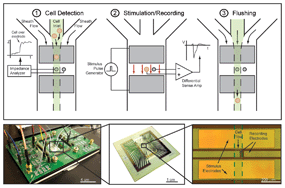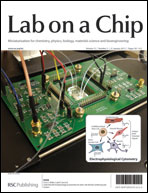Stem cell therapies hold great promise for repairing tissues damaged due to disease or injury. However, a major obstacle facing this field is the difficulty in identifying cells of a desired phenotype from the heterogeneous population that arises during stem cell differentiation. Conventional fluorescence flow cytometry and magnetic cell purification require exogenous labeling of cell surface markers which can interfere with the performance of the cells of interest. Here, we describe a non-genetic, label-free cell cytometry method based on electrophysiological response to stimulus. As many of the cell types relevant for regenerative medicine are electrically-excitable (e.g. cardiomyocytes, neurons, smooth muscle cells), this technology is well-suited for identifying cells from heterogeneous stem cell progeny without the risk and expense associated with molecular labeling or genetic modification. Our label-free cell cytometer is capable of distinguishing clusters of undifferentiated human induced pluripotent stem cells (iPSC) from iPSC-derived cardiomyocyte (iPSC-CM) clusters. The system utilizes a microfluidic device with integrated electrodes for both electrical stimulation and recording of extracellular field potential (FP) signals from suspended cells in flow. The unique electrode configuration provides excellent rejection of field stimulus artifact while enabling sensitive detection of FPs with a noise floor of 2 μVrms. Cells are self-aligned to the recording electrodes via hydrodynamic flow focusing. Based on automated analysis of these extracellular signals, the system distinguishes cardiomyocytes from non-cardiomyocytes. This is an entirely new approach to cell cytometry, in which a cell's functionality is assessed rather than its expression profile or physical characteristics.

You have access to this article
 Please wait while we load your content...
Something went wrong. Try again?
Please wait while we load your content...
Something went wrong. Try again?


 Please wait while we load your content...
Please wait while we load your content...